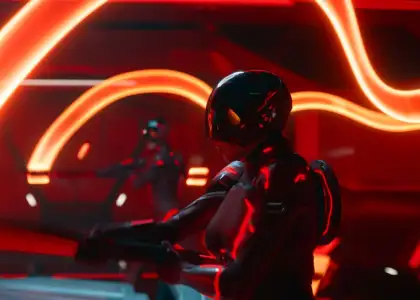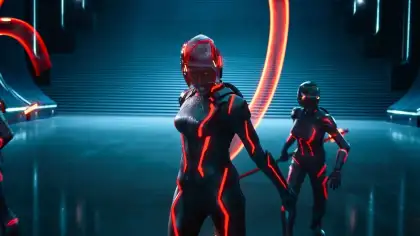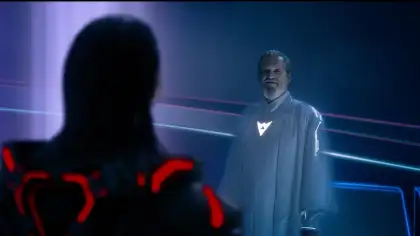Off-Grid and Into Reality: ‘TRON: Ares’ Flips the Digital Script

More than two decades after the original “Tron” introduced audiences to the neon-lit realm of the Grid and its Programs — and 15 years since “Tron: Legacy” delivered a visually stunning journey through that digital frontier — Disney is once again pulling us back into the game. This time, however, the studio flips the digital script, sending Programs “off-grid” and bringing the fight into our world.
“TRON: Ares” puts the spotlight on Ares (Jared Leto), a highly sophisticated Program sent into the real world on a dangerous mission, marking humanity’s first face-to-face encounter with AI beings. The film follows his journey from a digital warrior built for battle to a sentient being learning what it means to feel. It’s part action, part self-discovery, with a premise that feels surprisingly timely.
Directed by Joachim Rønning, the film takes audiences on an action-packed journey filled with neon-lit motorcycle chases, brutal on-and-offline battles, and a surprisingly thoughtful character arc that carries a touch of Disney heart. It also boasts a stellar and diverse ensemble cast, including Greta Lee, Evan Peters, Hasan Minhaj, Jodie Turner-Smith, Arturo Castro, Cameron Monaghan, Gillian Anderson, and Jeff Bridges, who reprises his iconic role as Kevin Flynn — the founder of Encom and creator of “Tron.”
Given how fast technology is evolving and how AI has become such a hot topic, revisiting the “Tron” universe now feels like a smart move. “TRON: Ares” explores both the bright possibilities and darker dangers of AI, imagining a future where digital beings don’t just live in The Grid, but walk among us. It’s a timely concept brought to life through jaw-dropping visuals, thrilling battle sequences, and a pulsating score that amps up the tension.
That said, while the movie delivers on spectacle, it stumbles a bit when it comes to emotional depth. The fast-paced plot often overshadows Ares’ character development, which is a shame since he’s the emotional core of the story. What could’ve been a powerful journey of an AI learning to feel sometimes gets lost in the noise of all the action.
We had the chance to see the film ahead of its world premiere on Oct. 10, and here’s what we thought.

‘TRON: Ares’: Big Action, Small Emotion
Ares is the brainchild of Julian Dillinger (Evan Peters), grandson of Ed Dillinger — founder of Dillinger Systems, as introduced in the previous films in the franchise. Just like how his grandfather wrote the Master Control Program (MCP), Julian made Ares an unstoppable MCP, one that is able to learn, grow, and adapt, making it the ultimate weapon. Julian currently has access to generative lasers that reconstitute digital beings into the physical world. Just think of it as a very advanced 3D printer with massive lasers.
In the film, Julian plans to sell the Program to the military, but just like how today’s Generative AI is still in its early stages, the tech here also has some major flaws; one being that it is unable to perform what it’s originally programmed to do, as everything the laser creates disintegrates in 29 minutes. This defect can only be rectified by the so-called “Permanence Code,” which was created by Kevin Flynn and rediscovered by Eve Kim (Greta Lee), Encom’s current CEO. This becomes the catalyst that sends Ares moving in the real world.
In an attempt to properly rectify this flaw, Julian sends the MCP on a mission to capture Eve and retrieve the code, which basically means to kill her. But upon their encounter, Ares is bombarded with mass data filled with life experiences that made him grow curious, as he’s introduced to certain “feelings.”
The film opens with an impressive hook, using a montage of news headlines to deliver a thorough backstory and quick recap — a clever nod to “Tron: Legacy,” which used a similar device. Although “TRON: Ares” was designed as a “soft sequel” that can stand on its own, this opening is a nice treat for longtime fans. It situates the story within the larger Tron timeline, helping viewers pinpoint exactly where this chapter fits.
Early on, the film draws another smart parallel to Legacy. The sequence where Julian infiltrates Encom’s servers in search of the Permanence Code mirrors Sam Flynn’s daring break-in at the start of the 2010 sequel. But this time, the perspective is flipped. Instead of a human sneaking into the system, we see Programs infiltrating through the digital space. The film visualizes hacking not as lines of code but as a full-blown battle on The Grid — transforming a simple digital breach into an intense, cinematic showdown. It’s a fresh and visually exciting way to reinterpret a familiar moment from the franchise. And coupled with the invigorating techno score by Nine Inch Nails’ Trent Reznor and Atticus Ross, it’s easily one of our favorite parts of the film.

With the film leaning heavily on action sequences, we felt that the score gave each scene its own unique identity, equipped with high-stakes emotion and emotional undertones. This film definitely had better music compared to its predecessors.
The plot was fast-paced, keeping audiences seated and attentive. Tron has always been known for its Light Cycles, and while seeing them on The Grid was a spectacular experience, nothing could have prepared us to see these magnificent vehicles on an actual road, which proved just how fast these motorcycles could be. The chase scene between Eve, Ares, and the equally lethal Program Athena (Jodie Turner-Smith), across the city, had our hearts racing!
More than the Light Cycles, the other modes of transport introduced here were also spectacular, from the planes to the winged suits akin to Marvel’s Iron Man. It was a treat to see different kinds of weapons apart from the iconic disks.

While this sci-fi adventure delivers on thrills, it falls short when it comes to character development — especially with Ares. The film’s core premise revolves around a digital being learning to feel, but that transformation happens too quickly and without much depth. His emotional awakening is mostly conveyed through the data he processed, like glimpses into Eve’s life: witnessing the loss of her sister and discovering “Frankenstein,” where he latches onto the line “I am fearless and therefore powerful.” This moment sparks his break from Julian’s control, and not long after, he abruptly decides he wants to become “permanent.” From there, he strikes a deal with Eve: he’ll protect her in exchange for the Permanence Code.
While it’s charming to watch him encounter new sensations and emotions, the film doesn’t fully explore this journey. It could have benefited from more moments — both subtle and significant — to trigger his growth and deepen his emotional arc. This issue is amplified by Jared Leto’s performance, which remains fairly one-note throughout the film. He’s brilliant at embodying a Program, but once Ares begins to feel, there’s little visible shift in his expressions or demeanor to mark that evolution. As a result, the emotional core that should have anchored the story feels underdeveloped, and made the ending feel cheesy.
On the other hand, the antagonists in this film were noteworthy. We especially loved Evan Peters’ performance as Julian. He was the kind of villain you hate, but also can’t help but feel impressed by. He might be reckless, power-hungry, and a thief, but the fact that he coded Ares shows his brilliance. Similarly, Athene started as a minor character who transformed into a full-blown villain. We had hoped we had gotten to see more sides of her apart from being a lethal weapon, especially after seeing a glimpse of her hesitation upon her first contact with rain. But again, the film failed to explore this further and instead focused on the action.


Greta Lee’s performance was also good, and she had a clean and well-structured character arc. However, we hoped her character had been utilized more to amplify Ares’ evolution. It would’ve been better to see their relationship grow deeper — not necessarily in a romantic sense, but simply as two people learning to accept and manage complex emotions.
Meanwhile, Jeff Bridges’ participation was a treat for fans of the Tron films, and seeing the game in its 80s version was definitely fun. But his scene with Ares wasn’t as impactful as we’d hoped. It did, however, give us some good quotes, like how the Permanence Code should have been called “Impermanence” because compared to a Program with thousands of cycles, a human only has one. This highlighted the ephemeral aspect of our lives and how being able to feel things and make our own choices is still better than being an all-powerful immortal with a hollow center.
Final Verdict
Expect “TRON: Ares” to take you on a thrilling ride of action on and off-grid. But while the premise promises to highlight the evolution of an AI entity learning to feel, it lacks impact and falls short on its emotional connection.
At first watch, it may be easily overlooked as you’re bombarded with non-stop action sequences equipped with stunning visual effects and great music, but for those who are more inclined to enjoy character-driven stories, this might feel a little hollow. However, it was amazing to watch on the IMAX screen, so if you were to watch it in theaters, we recommend seeing it in 3D for the full experience.
“TRON: Ares” is now showing in cinemas in the Philippines and the rest of the world on Oct. 10, 2025!
Follow Walt Disney Studios on Facebook, X (Formerly Twitter), and Instagram for more Disney movie magic.
Get the latest curated content with The Beat Asia's newsletters. Sign up now for a weekly dose of the best stories, events, and deals delivered straight to your inbox. Don't miss out! Click here to subscribe.















































